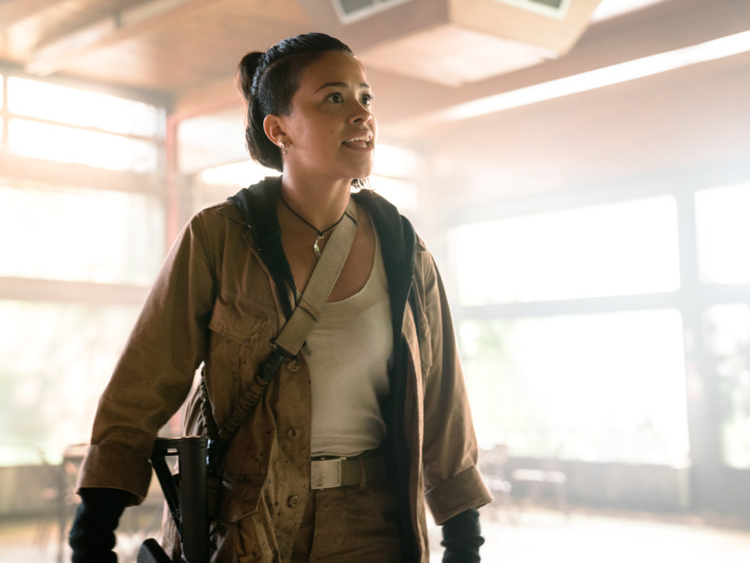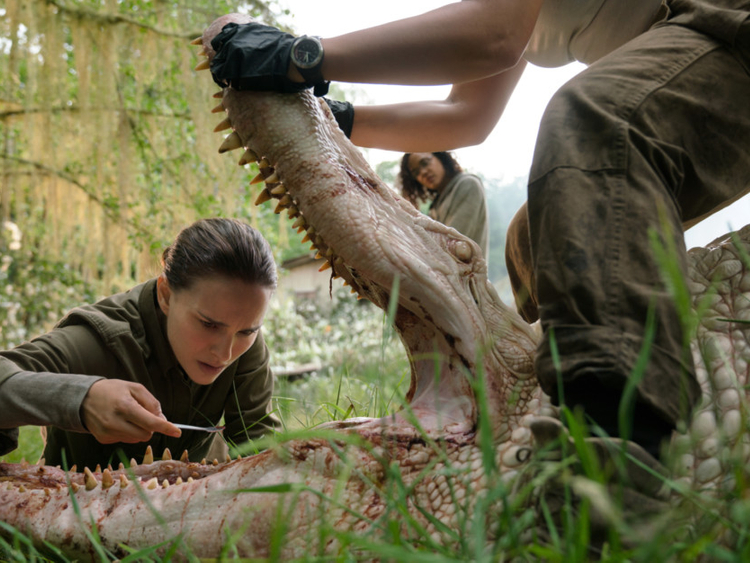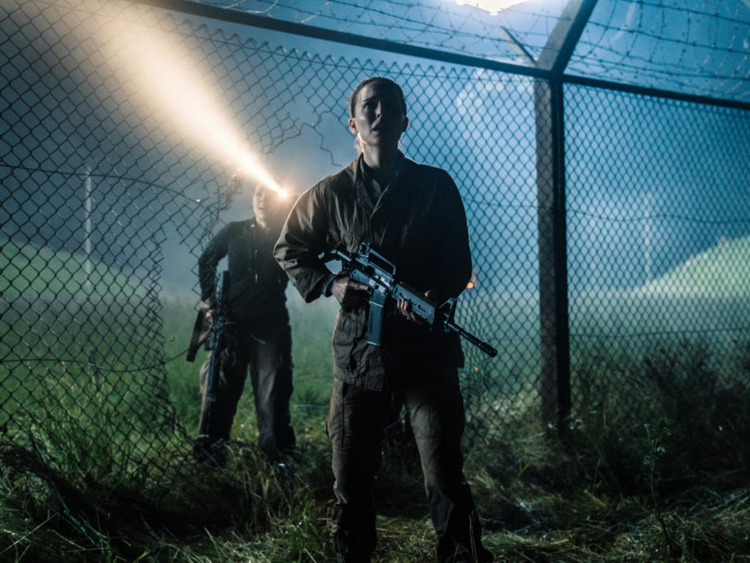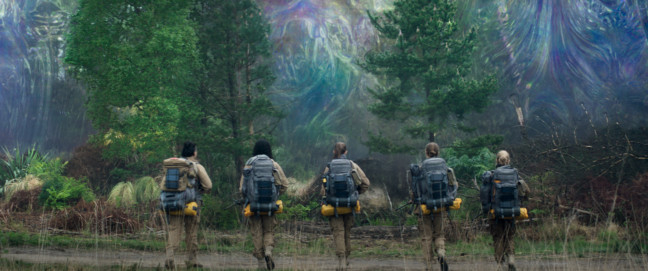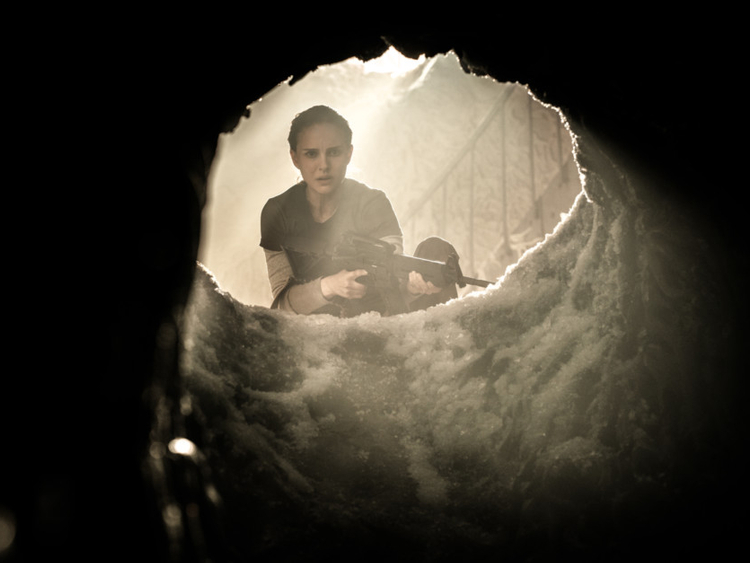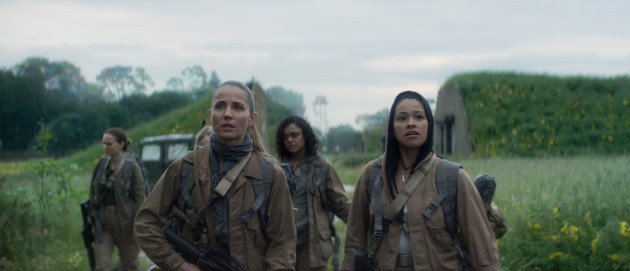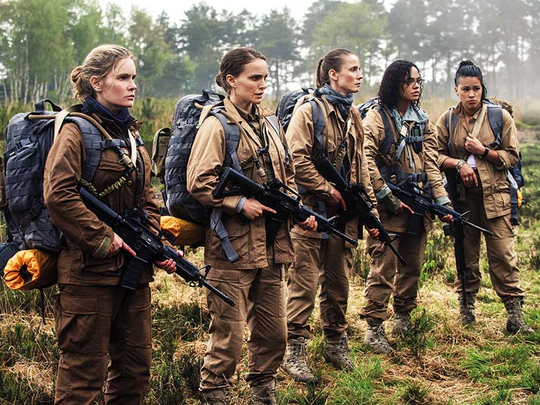
Onscreen in the sci-fi odyssey Annihilation, an expedition ventures deep into a foreboding terrain known only as Area X, carrying guns and harbouring mounting suspicions about one another.
These soldiers — a psychologist (Jennifer Jason Leigh), a biologist (Natalie Portman), a paramedic (Gina Rodriguez), a physicist (Tessa Thompson) and an anthropologist (Tuva Novotny) — enter what is about to become a living, breathing nightmare, an environmental disaster zone without scientific explanation, as filtered through the mind of Ex Machina director Alex Garland, adapting the first book in Jeff VanderMeer’s Southern Reach trilogy.
The fact that they’re all complex and dimensional female characters is at once trailblazing and, refreshingly, perfectly normalised.
“Each of the women have their own destructive behaviour,” said Portman, who brings steely intensity to the role of Lena, the biologist with her own reasons for volunteering for the dangerous mission. “I find that so beautiful. That’s the greatest science fiction, when the psychological becomes externalised.
“And to have five women at the centre of this expedition — we’re so used to seeing five men going and doing something together, it’s not even questioned why it’s always all men. To give that same kind of attitude to five women is really unique.”
The sisterhood struck on the London set of Annihilation is still strong between Portman, Rodriguez and Thompson, reunited in a suite at the Hollywood Roosevelt Hotel ahead of the film’s Los Angeles world premiere. Sitting side by side on a couch with their legs curled up, the camaraderie came flooding back in waves of laughter and mutual admiration.
“I feel like [Annihilation] is the kind of movie where if you’ve seen it only once you haven’t seen it,” said Thompson. “One of Alex’s references for this film was [Andrei Tarkovsky’s] Stalker, which I watched a couple times in anticipation of making this movie, trying to figure out what that film is, and means. It felt like being inside of a meditation.”
“Ooooh!” gasped Rodriguez. “That’s poetic. It’s like being inside of a meditation.”
“But you know what I mean? It’s a very meditative, lyrical film and we don’t have a lot of practice as audience members with that kind of content, particularly in American film,” Thompson continued.
“I feel like we reject it quickly too, the way they did with Darren Aronofsky’s mother!, which I loved,” added Rodriguez, gesticulating to the sky. “I thought it was Jennifer [Lawrence]’s best performance. It made me think for hours. Art that moves you in any which way, whether it’s positively or negatively — it’s working.”
Part philosophical sci-fi, part psychedelic-existential fever dream, Annihilation pulses with the looming unease of the unknown. That unknown lurks in the darkness of the vast swamplands and marshes of the Southern Reach, marked by the beauty and horrors of nature run amok, and perhaps more disturbingly in the disquiet of confronting those same mysteries within oneself.
Self-destruction is in our DNA, the film posits. Its approach, however, is one of empathy. And the journeys the three stars went on in search of their characters, expanded in collaboration with Garland from the sparsely detailed counterparts in VanderMeer’s book, had profound and lasting effects.
Portman, who moved her family near the Pinewood Studios production during filming, responded to the melancholic interrogation Lena embarks on as she pushes farther into Area X while reflecting on a broken marriage (Oscar Isaac, reuniting with Ex Machina helmer Garland, plays her husband).
“Alex brought the [idea of] self-destructive behaviour, and defining the destruction of a marriage as part of that,” she said. “You could call it moralistic, but I found it very moving — that it is destructive, hurting someone that you love very deeply.”
The physicality of the shoot demanded Portman know her way around a military-issue machine gun and train with visionary dancer Bobbi Jene, whom Garland hired on Isaac’s recommendation to choreograph a memorable third-act sequence of movement.
“She would give me directions like, ‘Feel like you’re like an octopus stuck to the wall,’” raved Portman. “I wish someone was always giving me that kind of physical imagery. It was really cool.”
Thompson found a deep connection to her character Josie’s growing link with the mutations the group encounters as they get closer to the inexplicable veil of energy known as The Shimmer.
“There was something in it that I was really struck by in the destruction of the Earth, of how we treat the other things that are not human — the planet,” she said. “At a certain point with the destruction that we do, we will not have the technology to undo it or to even understand it.”
The project, she added, also forced her to consider her own mortality. “I don’t spend a lot of time contending with the fact that time is not endless,” she said . “I really live in that fallacy, personally. I’m getting older, my parents are getting older... I actually looked forward to spending some time thinking about that.”
Getting personal
Rodriguez’s character Anya, a paramedic with a physical swagger, has an outgoing personality that masks her own addictive personality and deep-seated fears — a theme that resonates in Rodriguez’s own life.
“I didn’t realise how much of my personal draw to the character was her reason for going into The Shimmer,” she admitted. “Her reason for going on a suicide mission was running away from her past and her addictive personality, her addictions, and her fear of mental illness, and her fear of losing control of herself.
“I’m always battling the idea of mental health,” Rodriguez continued. “My fear of it personally, the history of mental health in my family, and not ever really facing it because in my culture we don’t really talk about mental health. I got to actually enter my own fear as an actor.”
Also tantalising for Rodriguez was the chance to step outside her popular Jane the Virgin TV alter ego. “Being able to play this very outwardly unafraid badass ... was so dope,” she said. “As an artist you want to transform, you want to be anything, you want to be able to be capable of doing anything, and I felt like Alex was telling me I could.”
There was one caveat: She had to shave her head for the role just three days after wrapping on Jane the Virgin. “It was very fun to do and also really awful and scary,” she laughed. “It felt like night and day. They cut all my hair off and I was like, ‘Who am I?’ And then Alex was like, ‘Let’s go on a journey of wondering who we are!’ Oh man, it was crazy.”
“She had beautiful long hair,” Portman said , smiling at Rodriguez. “She was hair commercial-perfect. I shaved my head for V for Vendetta and I loved it. The first time you feel rain or a shower on your bare head, it’s so magical. You looked so awesome with it! But it was very brave.”
“I was very lucky I had them saying that the whole time,” Rodriguez grinned, pointing to her cast mates, “because I needed to hear it.”
Thompson smiled slyly. “And a huge contingent of the internet were convinced that she and I were lovers in the movie.”
“I’m not gonna lie — I kind of wanted this,” Rodriguez teased.
“There are at least 15 tickets being sold because they think Gina and I are in a lesbian relationship,” added Thompson.
Rodriguez: “More than 15!”
Portman, laughing: “I’d buy tickets to that!”
It was almost two years ago that the cast of Annihilation assembled in London to shoot the ambitious and heady film. Their lushly immersive sets commandeered one corner of the historic Pinewood Studios as another sci-fi flick, Star Wars: The Last Jedi, shot on neighbouring stages.
The material was physically and mentally demanding, and Garland’s decision to film chronologically meant that the longer production went on, the more exhausting it became.
When it came time to shoot one of the film’s most harrowing scenes, the feeling on set was palpable. With three of the cast tied to chairs inside a dimly lighted abandoned house and Garland himself operating a massive animatronic bear head menacing his stars, the scene felt real.
“In that moment it was about truly facing our mortality, and because we shot the film in sequence, by then we were tired and had lived in this for a little bit,” said Thompson. “By then we really had this bond.”
They formed that bond under tents in the rain between takes, by going out to sushi dinners and becoming friends. Thompson and Portman tease Rodriguez, then newly out of what she describes as a “nail-in-the-coffin” relationship, about how she went full-on Eat, Pray, Love on their weekends off.
“I was jealous because you had fun adventures,” Thompson said, turning to her. “I’d be like, ‘Where are you?’ because we were neighbours and we lived one flight away from each other, when I was bored or wanted a sandwich, and she’d be like, ‘I’m on a yacht!’ She was Eat, Pray, Love every weekend and I was training for Thor: Ragnarok doing sword work.”
A group night out at a Radiohead concert arranged by Portman was, Rodriguez said, “the gift of the century.”
“Whatever,” Portman demurred. “It was because I was with you guys! We were like, ‘This is normal! I’m not a suburban mom of two! I’m, like, a cool person!’”
Time’s Up
The trio found themselves linking up again after Annihilation with a very different goal: Combating sexual harassment across industries, including their own, as founding signatories of the Time’s Up movement this year.
“I feel like it’s a continuation of the sisterhood we started on this movie,” Portman said of her friendship with Thompson and Rodriguez. “It was really awesome to get to experience each other in a new light; as colleagues, and then friends, and then fellow activists.”
Thompson has been heartened to see Time’s Up take hold in the culture, and by the importance her peers have placed on intersectional activism.
“Any measure of success that Time’s Up specifically has had has to be connected to what’s outside of our industry,” she said. “It began with a call to arms from the Farm Workers’ Alliance, from the women who literally put food on our table, to say, ‘We stand with you because we understand what we’re going through, and it happens in our industry.’ So it’s bigger than us.
“Having worked in the industry for as long as I have and particularly as a young woman of colour, it’s hard to gain access — even when you gain a measure of a platform to really get your voices heard,” she added. “It’s important to have sisters to make sure your voice is as vital.”
Both Thompson and Rodriguez cheer Portman’s Golden Globes moment this year when, presenting the director category during the live telecast, she went off script to point out the absence of any female directing nominees
“I’ve got a video of it, girl!” said Rodriguez.
But Portman downplayed her onstage gesture as just one of the many ways the hundreds of members of the Time’s Up movement are trying to effect change: “If you look around the room and everyone looks like you, there’s a problem and not only should it feel weird, but you need to do something about it.
“I think a lot of us have had our eyes opened,” she added. “I speak for myself; I haven’t always had my eyes open. And it’s an amazing, energising, incredible feeling to be awakened to this, even though it’s a lot of ugly truths to try to change — to change myself first and try to be part of this cultural shift.”
All three women have used their successes to advocate for various causes important to them. But Time’s Up has given many of Hollywood’s artists a focus to pool their platforms with Voltron-esque force.
Rodriguez has for years pushed for greater Latino representation in entertainment. “What you end up realising is that things don’t get done alone,” she said. “To know that I finally have somewhere to funnel my energy with the power and the strength of these ladies ... you just don’t feel alone anymore.”
Rodriguez added directing to her arsenal by helming her first episode of Jane the Virgin, joining Portman, who made her feature directing debut in 2015’s A Tale of Love and Darkness, behind the camera. Thompson announced that she will produce a film about jewellery thief Doris Payne, which she will also star in for Codeblack Films and Lionsgate — and says she’s working up to one day directing, as well.
After the female-led Annihilation, Portman, Rodriguez and Thompson hope more films will follow suit as Hollywood sees long overdue change in the way stories are told.
One vital next step, Rodriguez notes, will be getting more underrepresented voices hired behind the camera, and more diverse projects backed, in a Hollywood that remains risk-averse when it comes to making inclusive choices.
“In so many of these meetings I feel like I’m trying to sell a story about oranges to people who have never had oranges before,” said Rodriguez, notes of hope and frustration in her voice. “They know it’s profitable-ish, but they’re afraid of it because they don’t understand it.
“It’s exciting and discouraging at the same time. I celebrate the fact that I’m in that room. Hopefully at one point it’s going to work —and I’m going to be able to get even more people in the room.”
___
Don’t miss it!
Annihilation is now streaming on Netflix



